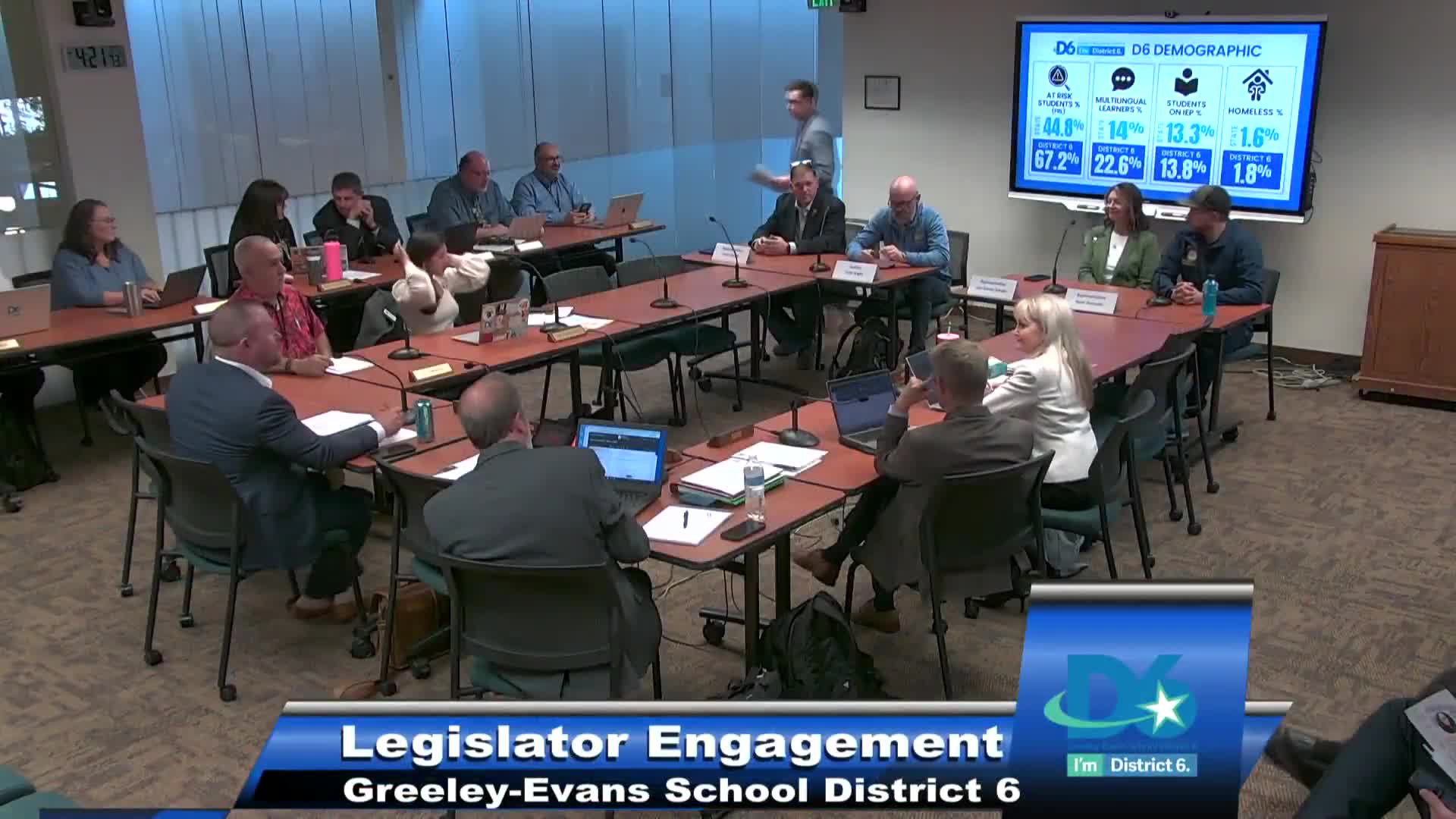Greeley-Evans School District 6 and state legislators discuss school finance, unfunded mandates and local control
Get AI-powered insights, summaries, and transcripts
Subscribe
Summary
District 6 board members met with state legislators to press for continued at‑risk funding, flag costs from recent state laws and urge lawmakers to consider local capacity before adding mandates. Officials cited technology accessibility, juvenile‑justice student supports and data gaps after universal school meals as specific strains.
GREELEY, Colo. — Members of the Greeley‑Evans School District 6 Board of Education met with state legislators Wednesday in a work session to press for continued school‑finance support and to flag the local cost of recent and proposed state laws.
The board and district staff told visiting lawmakers that the district serves roughly 23,124 students and has substantially higher shares of students categorized as at‑risk and multilingual learners than the statewide average, making the new at‑risk funding formula especially important to District 6. District legal counsel Nate Fall called out three priorities the board wants addressed at the Capitol: unfunded mandates, a return to local control and continued implementation of the at‑risk school‑finance formula.
Why it matters: District leaders said recent state laws and compliance deadlines require significant staff time and systems changes and can divert money and personnel away from classroom needs. Board members and staff urged legislators to ask, before passing new requirements, who will do the work and whether districts have the resources to comply.
District officials described several concrete strains. Fall said the district must now provide an identified justice‑engaged point of contact to coordinate education for youth involved with juvenile justice, a role currently handled by an existing staffer, Tammy Segura, whose duties have expanded. Fall also described the workload and vendor changes created by a civil‑rights/immigration‑status privacy law that required policy adoption and software changes on a compressed timetable, and he detailed the district’s multi‑year effort and expense to meet state digital accessibility standards under Colorado’s disability law.
“Nate Fall” was explicit about the operational impact: districts have had to reconfigure student information systems, adopt board policies and run additional staff training to meet recent requirements — often with short deadlines. Fall credited communications staff, including Teresa Myers and Kim Desmond, for leading much of the accessibility work internally.
Legislators who attended — including Representative Ryan Gonzales, Representative Laurie Garcia Sander, Representative Scott Slaw and Senator Scott Bridal — said they heard the district’s priorities and encouraged continued communication and school visits. Representative Ryan Gonzales (House District 50) said he seeks to “vote my district” and described his legislative priorities as protecting K‑12 funding, higher education and Medicaid during a constrained state budget cycle. He added that concerns from his constituents about food waste influenced his “no” vote on a universal school meals bill he discussed.
Board members and staff raised several specific program and data issues during the discussion:
- Dyslexia screening: Board members supported universal dyslexia screening but said existing screening tools can take up to 45 minutes per student and the district lacks funding to provide subsequent supports. District leaders said they are exploring different screening tools and potential public–private partnerships to expand services.
- School meal data: With universal school meals in place, collection of free/reduced meal forms has dropped. The district reported it still tries to collect household data but noted that it relies in part on SNAP/Medicaid matches to identify eligible students; district staff estimated the underlying need may be about 71 percent but said the figure is “not specified” with certainty.
- Technology accessibility: Fall said compliance with the state’s web accessibility standards required substantial vendor work and internal staff time, producing tens of thousands of dollars in costs and large operational burdens for districts that lack dedicated accessibility staff.
- Justice‑engaged students: Fall described the requirements of a law intended to protect the education rights of youth in custody or on probation and the district’s effort to provide timely reenrollment and credit for coursework completed while justice engaged.
Legislators noted ways they and their colleagues can help. Several asked to be invited to school tours and encouraged board members to testify in committee hearings when bills affect local schools. Senator Bridal said superintendent testimony can be consequential in committee; district leaders highlighted that Superintendent Dr. Pilch had previously testified on school finance.
The meeting was largely a policy briefing and relationship‑building session rather than a forum for new commitments. No formal actions or votes were taken. Board members asked legislators to consider implementation capacity and fiscal consequences before advancing bills that require districts to change systems or add staff. Several legislators offered to help carry or revise bills that reduce local burdens.
The discussion closed with mutual commitments to maintain open lines of communication, and legislators invited to tour district schools and meet staff and students.
Ending: District staff said they will follow up with legislators on specific technical questions — including possible alternative measures for identifying student economic need and options to reduce the administrative burden of mandated training and reporting — and encouraged continued in‑district meetings as the session approaches.
